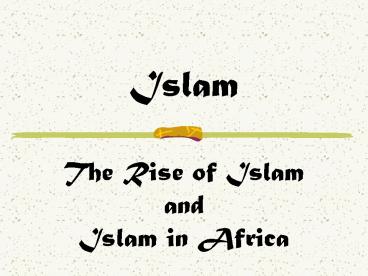Islam PowerPoint PPT Presentation
1 / 19
Title: Islam
1
Islam
- The Rise of IslamandIslam in Africa
2
570 Mohammad (also written as Muhammed) was
born.
- Orphaned and raised by an uncle.
- Became a successful businessman and had a family.
- He was unhappy with the way people were living
their lives.
3
610 Mohammad goes into the hills.
- While there he was visited by an angle who spoke
to him. - Told him to teach about Islam (which means
surrendering to Allah. - Allah is the Arabic word for god.
4
Mohammad returned a prophet and taught Islam.
- He traveled all over teaching.
- Some opposed his teachings, but the poor
especially liked what he said about sharing
wealth.
5
622 Mohammad and his followers left Mecca and
went to the city of Yathrib.
- Later, the city of Yathrib was renamed Madinah
which means city of the Prophet. - The year 622 was made the 1st year of the Muslim
calendar. - Hijrah the trip from Mecca to Madinah is a
pilgrimage called the hijrah.
6
Mohammad starts a government in Madinah.
- He applied laws he believed would lead to a good
Muslim life. - He created an Islamic state.
- A government that is run by religious teaching.
Also called a theocracy. - People had to be loyal to Islam above loyalty to
their tribe.
7
630 Mohammads new army conquered Mecca.
- He made it a holy city of Islam.
8
632 Mohammad died.
- After he died there was an argument over who
would be the next caliph (successor to the
Messenger of God). - Mohammads followers split into 2 groups.
9
Mohammads followers split.
- Shiites believed that Mohammads son-in-law Ali
should take over. - Sunnis believed that Mohammads father-in-law
Abu Bakr and the Umayyad dynasty to take over. - The 2 groups developed different religious
practices and traditions. They still dont get
along. - Today, most Muslims are Sunnis. Iraq and Iran
have the largest Shiite populations. Part of the
fighting in Iraq is between Sunnis Shiites.
10
Muslim Beliefs
- Muslims believe that their god speaks through
prophets - Examples Abraham, Moses, Jesus, and Mohammad.
- There are a few commonalities between Islam,
Christianity, and Judaism. - Their holy book is the Quran.
11
The Five Pillars of Islam
- Belief Muslims must declare that there is no
god but Allah and Mohammad is his prophet. - Prayer They must pray 5 times a day facing
toward Mecca. - Charity They must give to the poor.
12
The Five Pillars of Islam
- Fasting They do not eat from dawn to dusk
during the holiday of Ramadan. - Pilgrimage They must make the hijrah once in
their life (if at all possible).
13
1312-1337 Mansa Musa ruled over Mali
- He encouraged Islam.
- He didnt practice it very strongly, though.
- Helped with trade with Arabs.
14
1324 Mansa Musa went on a hijra.
- He made it a spectacle more than a religious
pilgrimage. - His wealth impressed the people he met.
- He convinced some architects, teachers, and
writers to return to Mali.
15
1325 Ibn Battua traveled from Morocco to West
Africa.
- Islam had been practiced in West Africa for
several hundred years when he arrived. - Islam was more popular in the cities.
- Many outside of the cities practiced traditional
religions.
16
1331 Ibn Battua traveled to Mogadishu.
- Mogadishu is in East Africa (today the capitol of
Somalia). - Its sultan (leader) spoke fluently to him in
Arabic, but also spoke Swahili. - Swahili is still the most common language in
parts of Western Africa. - In Arabic it means people of the coast.
17
1580 Sunni Ali was leader of the Songhai.
- He really practiced a traditional religion, but
claimed he was Muslim to gain support. - He was overthrown by Askia Mohammad.
- He was a practicing Muslim.
18
Askia Mohammad took over Songhai.
- He encouraged the spread of Islam.
- Under him, Songhai became the largest medieval
West African empire. - He made Timbuktu an important center for Islamic
culture and teaching. - Started around 150 schools.
19
1591 Songhai fell to Morocco
- The Songhai (last of the great West African
empires) fell to the Moroccans.

